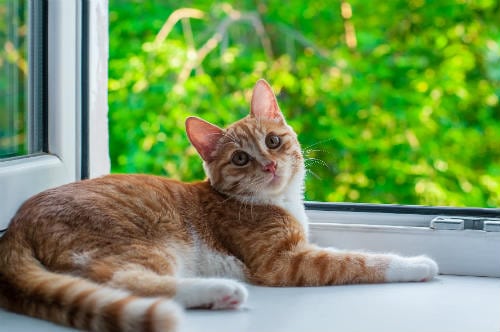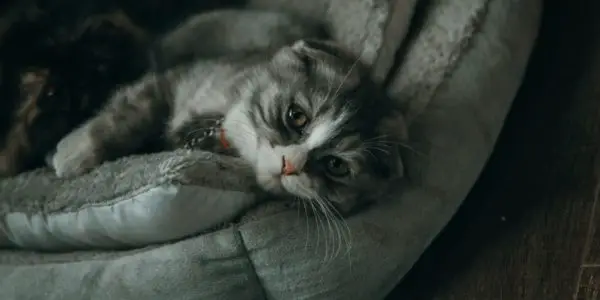Did you know cats can also suffer from urinary tract infections (UTIs)? A UTI can be caused by bacteria, viruses, fungi, or algae and may develop anywhere in the upper or lower urinary tract. Most of us have experienced a UTI at least once, but we often don’t think about our feline friends being affected as well.
UTIs in cats can be idiopathic, meaning the cause is unknown, but they’re usually secondary to another illness or medical problem. That’s why it’s crucial to consult a veterinarian if you suspect your cat has a UTI.
A variety of underlying conditions can lead to UTIs in cats. Feline immunodeficiency virus (FIV) weakens the immune system, making cats more susceptible to infections. Diabetes mellitus results in high blood glucose levels, providing an ideal environment for bacteria to thrive. Antibiotic usage may also cause bacterial resistance, leading to UTIs.
If left untreated, UTIs can become severe and even life-threatening. Male cats are particularly at risk due to their narrower urethras, making urinary blockages more likely.
Don’t let your cat suffer silently. Be vigilant about their health and visit the vet if you suspect a UTI.

How can you protect your cat from UTIs? The good news is that several precautions can significantly reduce your furry friend’s risk of developing a urinary tract infection.
First, consider keeping your cat indoors. This simple step can dramatically lower their UTI risk. Additionally, regular vet visits are essential for early detection and treatment of UTIs and any underlying conditions.
A proper diet also plays a vital role in UTI prevention. Cats obtain most of their hydration through food, so feeding them canned wet food can help. If your cat prefers dry kibble, moisten it with water before serving it to ensure adequate hydration.
However, the most effective and easiest way to reduce your cat’s UTI risk is to always provide clean, fresh water. Staying well-hydrated helps flush bacteria from their system, lowering the chances of infection.
Following these tips can help your cat stay happy, healthy, and UTI-free.
8 Signs Your Cat Has a UTI

Do you know how to spot a UTI in your cat? Since cats instinctively hide pain and illness, detecting a urinary tract infection can be challenging. However, knowing the signs to look for will help you identify the problem and get your cat the care it needs.
Here are some signs that your cat may be experiencing a UTI:
1. Struggling to pass urine or passing only small amounts: Keep an eye on the litter box for changes in urination frequency or volume, and consult a vet if needed.
2. Bloody or discolored urine: See veterinary care immediately if your cat’s urine appears pinkish or has visible blood.
3. Inappropriate urination: A UTI may cause your cat to avoid the litter box and urinate in unusual places, such as carpets or furniture.
4. Vocalizing while using the litter box: The pain and discomfort of a UTI may cause your cat to cry out when attempting to urinate. Excessive licking of the abdomen or urinary opening could indicate your cat is trying to soothe the pain associated with a UTI.
5. Increased water consumption: Monitor your cat’s water intake, especially if other symptoms are present.
6. Incontinence: Loss of bladder control may result from a UTI, causing spontaneous urination.
7. Frequent litter box visits: A UTI may cause your cat to urinate more often than usual.

8. Prolonged time spent in the litter box: Cats with UTIs may have difficulty passing urine, leading to extended litter box sessions.
Other potential UTI symptoms include a strong ammonia odor in your cat’s urine, lethargy, and vomiting. These signs may indicate a general illness, so monitor your cat for other UTI-specific symptoms.
Remember, early detection is key to helping your cat recover from a UTI. Keep an eye out for these signs and consult your veterinarian if you have any concerns.
What to Do if Your Cat Has a UTI
Is your cat showing signs of a urinary tract infection (UTI)? If so, scheduling a veterinary appointment as soon as possible is crucial. This is especially true for male cats, as bladder stones can cause life-threatening complications.
Your vet may take a urine sample to identify the infection source or prescribe treatment with a “wait and see” approach. This might involve medication and monitoring your cat over the next few days.

Treatment options may include:
1. Broad-spectrum antibiotics, like Clavamox, are typically administered orally.
2. Pain management through oral painkillers to help ease UTI discomfort.
3. Dietary changes, such as a wet food diet or higher quality prescription food, to prevent future infections.
4. Increased hydration to flush infectious organisms from the urinary tract. Entice your cat with tuna or clam juice, broth-based ice cubes, or diluted meaty baby food.

5. Urinary acidification using medication like Methigel increases urine acidity and inhibits bacterial growth.
6. Catheterization for cats unable to pass urine. Although painful and requiring anesthesia, this procedure is highly beneficial.
7. Surgery in severe cases to remove bladder stones or urethral blockages, requiring general anesthesia and potentially an overnight stay at the vet’s office.
[amazon bestseller=”cat wet food” items=”3″ template=”table”]
Some pet owners supplement vet-recommended treatments with glucosamine, chondroitin, cranberry products, or Bach Rescue Remedy. While these may be helpful, they should not replace proper veterinary care and should only be used after consulting your vet.
If detected and treated early, UTIs typically cause no lasting harm. However, untreated UTIs can lead to severe organ damage, sepsis, and even death. Act promptly to ensure your cat’s health and well-being.
Conclusion
UTIs can be painful and potentially life-threatening to cats. However, if they are caught and treated promptly with veterinarian-recommended methods, you have every reason to expect the best outcome for your cat.
As with most illnesses, prevention is the first line of defense. Ensure your cat eats a diet of nutritious wet food and has continual access to clean drinking water. If it’s within your means to do so, do not allow your cat to roam freely outside.
[amazon bestseller=”cat UTI treatment” items=”1″ template=”horizontal”]
Most importantly, make sure that your cat has regular veterinary visits. This will help identify a possible UTI early and any underlying condition that may be causing the infection.
How to Tell If Your Cat Has a Bladder Infection (Video)
10 Related Questions Concerning Cat UTIs
1. How can stress contribute to UTIs in cats?
Stress can weaken a cat’s immune system, making them more susceptible to infections, including UTIs.
2. Can UTIs be contagious between cats?
UTIs are generally not contagious, as they usually result from an overgrowth of naturally occurring bacteria in a cat’s body.
3. What is the typical duration of a UTI in cats if treated promptly?
With prompt and appropriate treatment, most UTIs in cats resolve within 7-14 days.
4. How can I prevent recurrent UTIs in my cat?
Address underlying conditions, provide a healthy diet, ensure proper hydration, maintain a clean litter box, and minimize stress in your cat’s environment.
5. Are some cat breeds more prone to UTIs than others?
While any cat can develop a UTI, breeds with predispositions to urinary tract issues, such as Persian cats, may be at a higher risk.
6. How does a veterinarian diagnose a UTI in cats?
A veterinarian diagnoses a UTI through a physical examination, evaluation of the cat’s medical history and urine sample analysis.
7. What are the long-term effects of UTIs on a cat’s urinary system if not treated properly?
Untreated UTIs can lead to severe organ damage, sepsis, chronic kidney disease, or even death.
8. Are there any natural remedies or supplements that can help prevent UTIs in cats?
Some natural supplements, like glucosamine, chondroitin, and cranberry products, may help support urinary tract health but should be used under a veterinarian’s guidance.
9. How can I make my cat more comfortable during UTI treatment?
Ensure proper hydration, provide a clean and comfortable environment, and follow the veterinarian’s medication and pain management recommendations.
10. Can a UTI cause behavioral changes in cats?
Yes, a UTI can cause changes in a cat’s behavior, such as increased vocalization, inappropriate urination, or lethargy.
"In ancient times cats were worshipped as gods; they have not forgotten this."
-- Terry Pratchett





